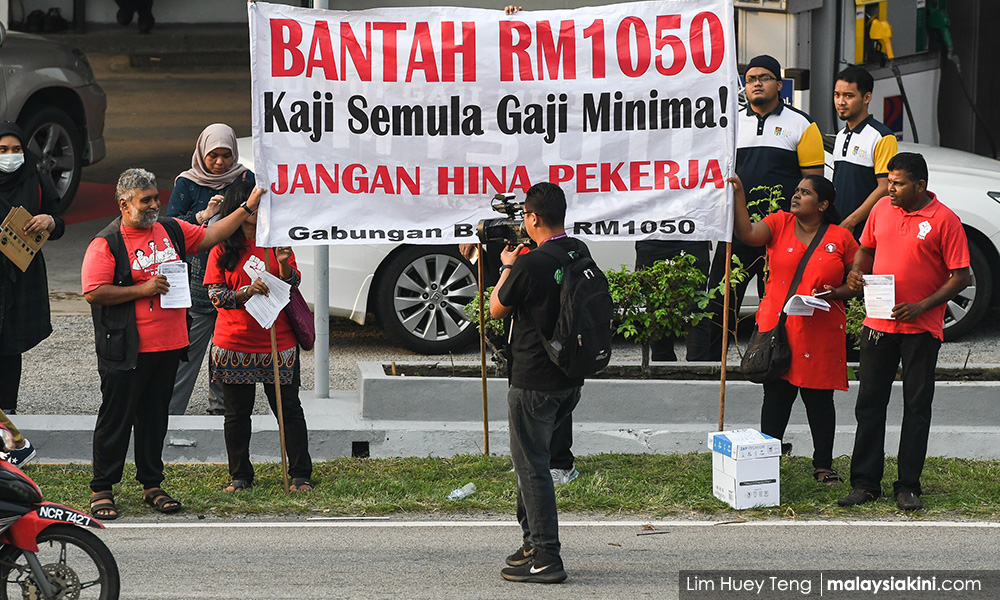ADUN SPEAKS | Skills formation, including wage determination, cannot be simply created, but to be sustained by allowing workers the fundamental right to freedom.
Skills formation amongst Malaysian workers cannot be reduced to the setting up of training institutions, but on a higher and more fundamental level, there must be freedom and democracy for workers to create values. Values are created and sustained if workers are given the freedom to determine what is important or unimportant for them. Minimum wage determination is one example.
If workers in Malaysia have the freedom to determine their wages, then there is no need for minimum wage, unless of course, the government wants to protect foreign workers. The big brother attempt to introduce minimum wage is one example of where workers in the country are not allowed to determine their wages in negotiations with employers. Government's intervention is merely an undemocratic exercise to take away the bargaining power of employees.
The major thrust of the present ongoing debate about the minimum wage for employees in the private sector in Malaysia is entered on the question of quantum. While employers and captains of the industry have welcomed the recent government move, the unions and employees, in general, feel that the majority of workers especially in the below B40 group, have been taken for taken for a ride. I suppose the debate about this important matter will rage on for a while.
The quest for minimum wage is a sad reflection of the state of industrial relations in the political economy of countries. I don't think minimum wage is very central to the nexus between employers and workers. However, in countries with low level of unionisation, lack of collective bargaining and strong government regulation, then the minimum wage becomes a necessity.
This is why most of the time, unionists with "trade union consciousness" get trapped into the minimum wage debate without realising that there are big issues at stake.
In other words, minimum wage becomes an economic necessity in countries to address labour grievances, especially those who receive wages that are hardly enough to meet their basic subsistence needs. Even if the advanced developed countries have the provision for minimum wage, such a presence is basically to address those categories of workers who do not fall within the ambit of collective bargaining leading to wage determination.
In these countries, the governments have a role in influencing wage decisions, but they do not function on behest of the immediate interests of employers. Longevity, and viability, of the system, requires the state to take on a seemingly neutral role, but this system's approach merely disguises the actual role of the government or the state.

Such a luxury is not available for government in emerging countries where the state takes a preponderant role without caring to disguise its bias towards the owners of capital.
It is not that minimum wage can be done away with in countries where workers have the power to negotiate and determine their wages. What I am saying is that this wage might not be that important as in countries that are fast developing.
The clamour for minimum wage can be seen in countries that have low unionisation, conspicuous lack of collective bargaining, employers' hostility and most importantly, governments that are based in favour of interests of employers. If the majority of workers have the freedom to negotiate and determine wages, then the importance of minimum wage not be there.
The debate about minimum wage in Malaysia would not have emanated under the conditions of labour freedom, mobility, high level of unionisation and collective bargaining. The absence of these provisions renders the importance of minimum wage with a huge expectation from the government.
But then, given the structural position of the present government, whatever its label, nothing much can be expected in the way of the minimum wage.

Alternatively, rather than asking the government to increase the quantum, I would think that unions and other pro-labour groups to pursue the question of labour freedom, abrogation of repressive labour legislation, and for the state to do away with the compulsory arbitration and other mechanisms that stand in the way of workers' independence. Workers' representatives should not miss the trees for the forests!
Malaysia has a lopsided industrial relations system that is weighted against workers. There are more than 15 million workers in the country, the majority don't even earn a decent living. Lack of trade union rights, compulsory arbitration in trade disputes, lack of collective bargaining and other labour repressive mechanisms have robbed the Malaysian working class a golden opportunity to determine wages by direct negotiations with employers.
I am not sure whether the Malaysian industrial relations system has become more progressive with the passage of time. The talk about bringing about amendments to labour legislation, linking productivity to wages and other proposed measures to reform the human resource system will remain empty as long as the government does not deal with the fundamental question of allowing the working class the freedom to negotiate with employers, in the absence of repressive laws and mechanisms, to determine wages.
I do not expect freedom overnight, but surely after more than 60 years of independence and the tremendous sacrifice of the workers for the nation, surely there must be some attempt to rethink the contribution of millions of workers, who hardly have a decent wage.
If workers are gradually allowed to determine their own wages, then there would not be much clamour for a minimum wage. In fact, the minimum wage would become merely academic, without any real value. However, given the preponderant role of the government in favouring employers' at the expense of workers and the large presence of reserve labour (read foreign labour), it would be unthinkable even to ponder on the question of workers' freedom.
From the time of political independence to now, the Malaysian government could never disguise its overt bias in protecting and advocating the interests of the owners of capital. Workers' have become mere appendages to the overall requirements of the system. Productivity is often uncritically approached from the employers' perspective.
No country worthy of its name would be able to make rapid economic advances without factoring the contribution and value of labour. It is only when a value is created of the contributions of labour, or employees, then we could talk about economic development. But then workers' cannot create value for the development of the system as a whole without freedom for them to think and function creatively.
Finally, the Malaysian industrial relations realm is in a quandary. On one hand, the government is serious about creating a skilled workforce to match the growing needs of the industry. On the other hand, the government seems not prepared to allow the labour force to create value by the way of freedom and democracy to deepen and advance the social and economic system.
P RAMASAMY is Penang deputy chief minister (II) and Perai assemblyperson.
The views expressed here are those of the author/contributor and do not necessarily represent the views of Malaysiakini.


